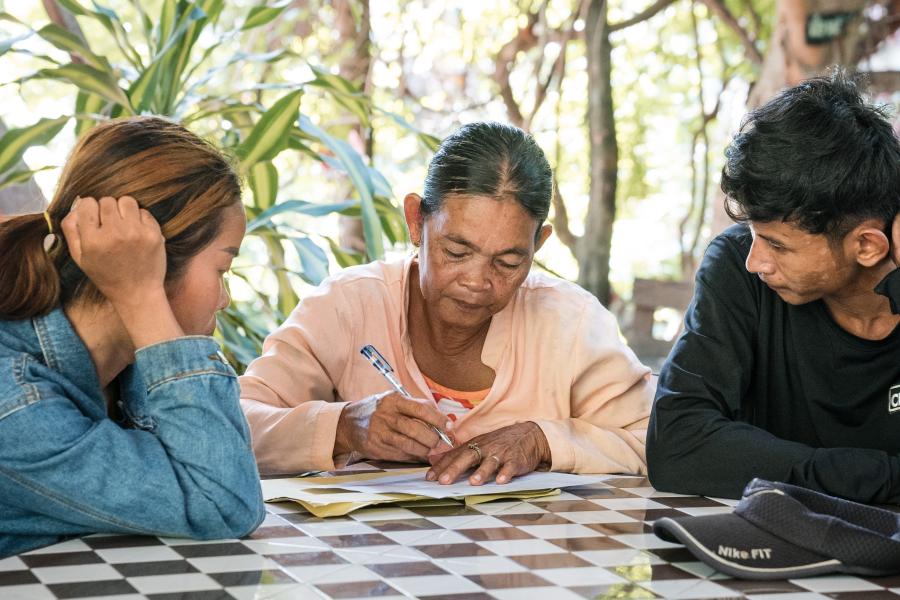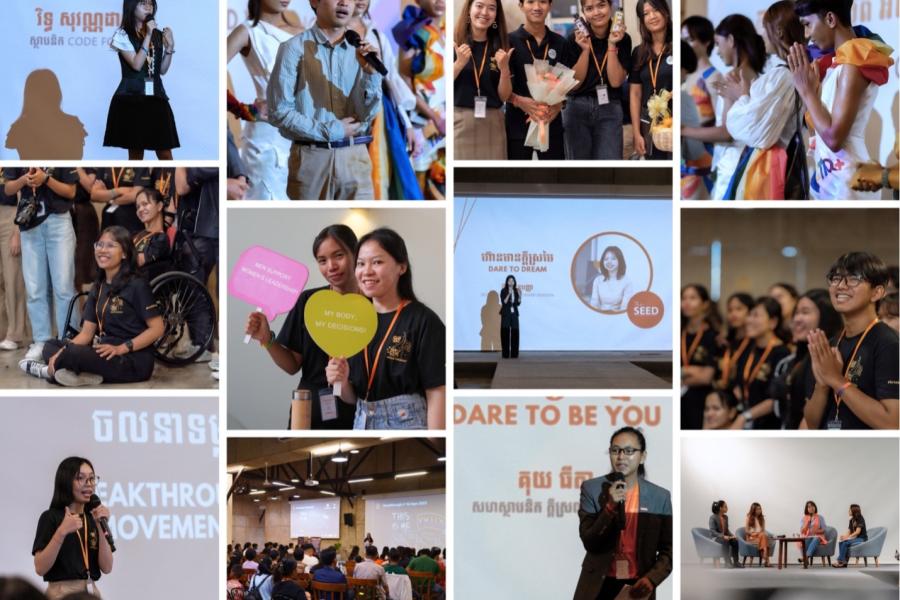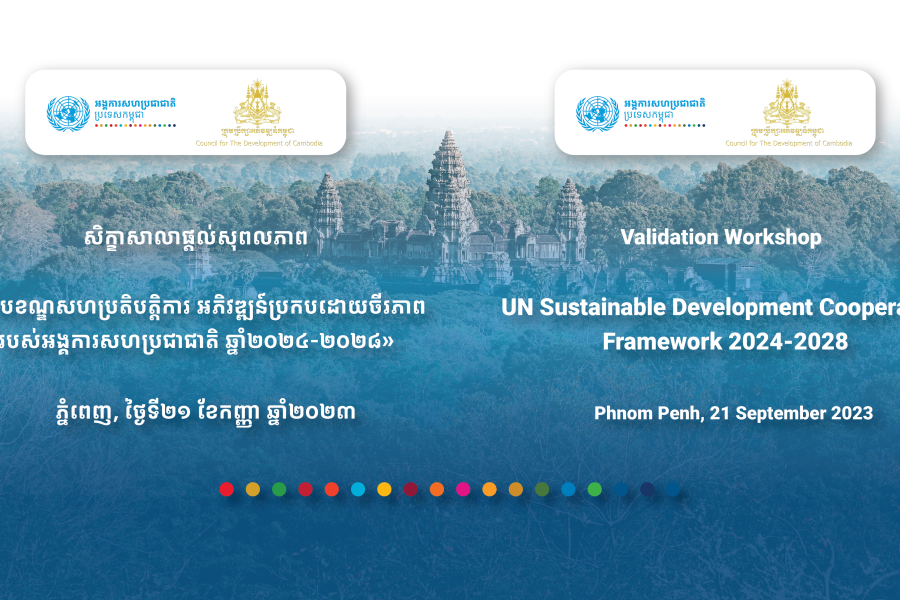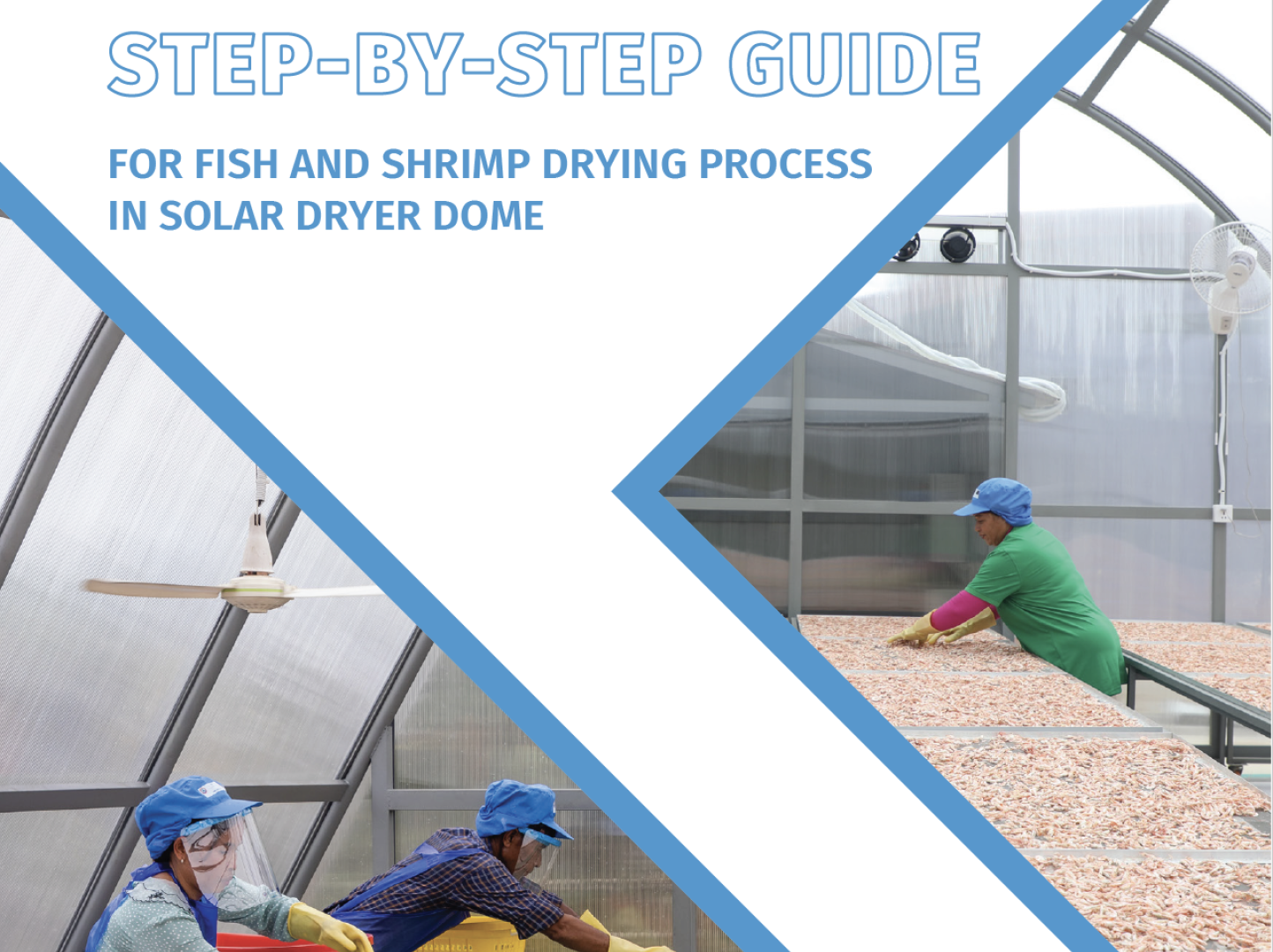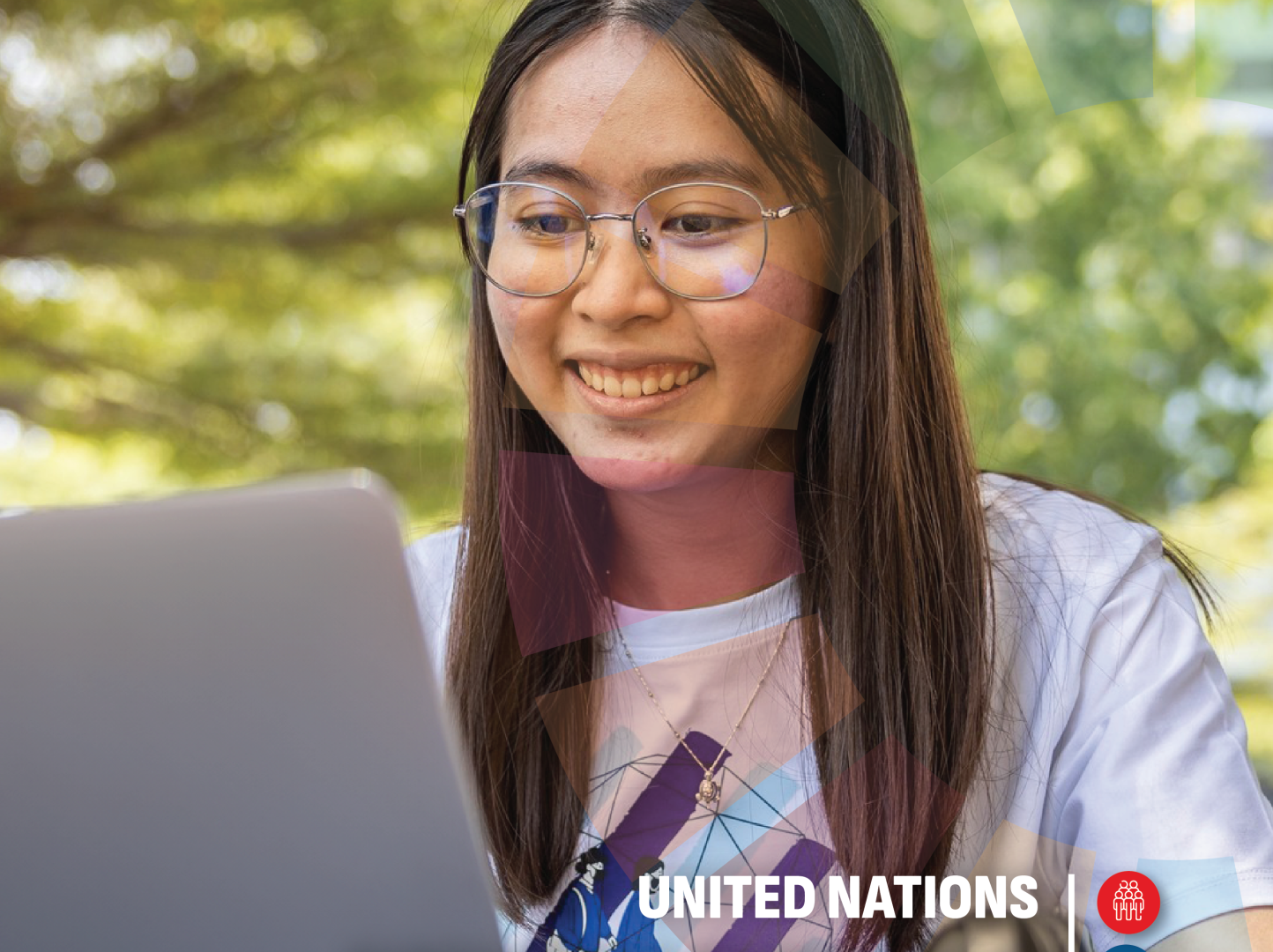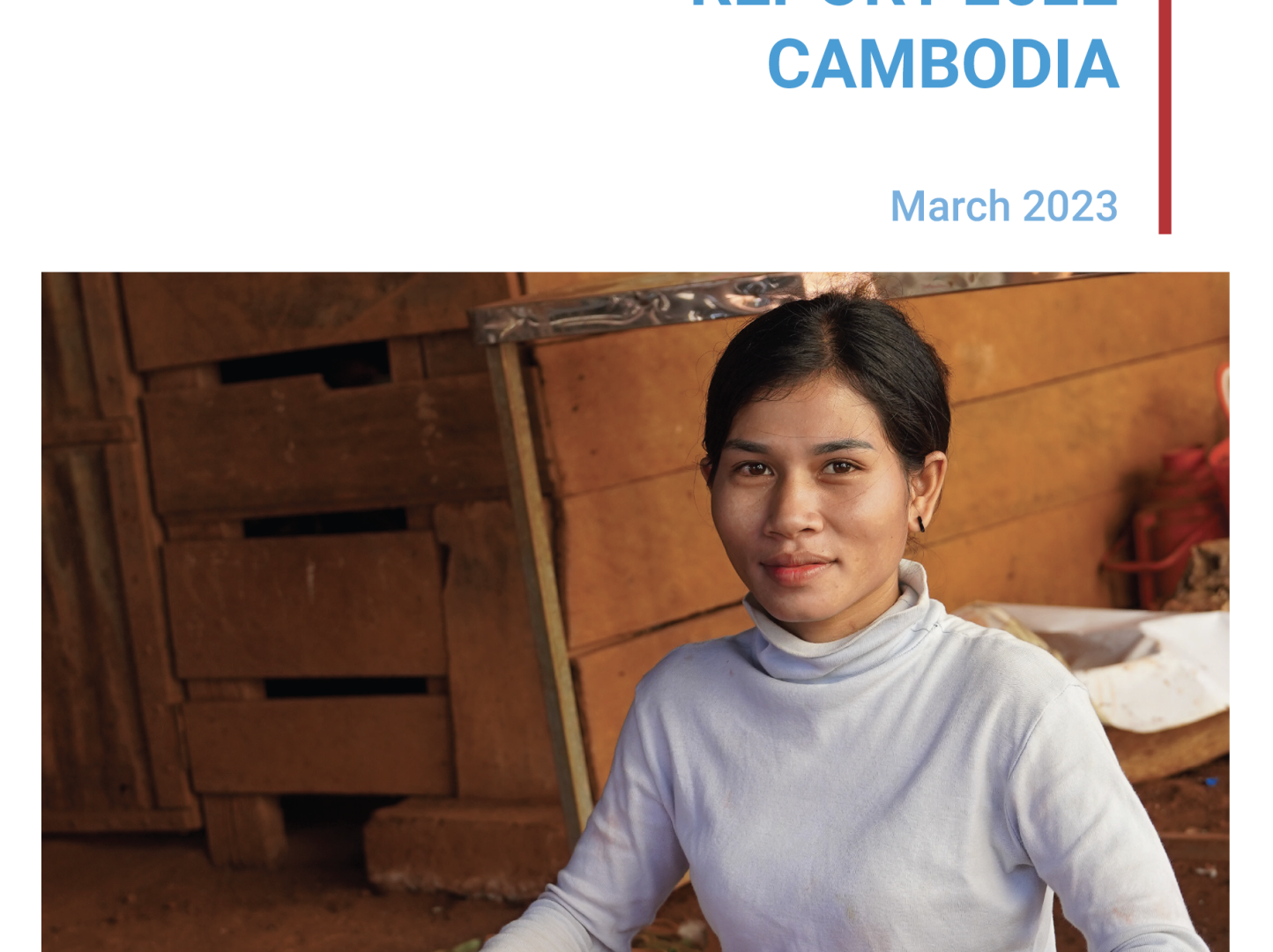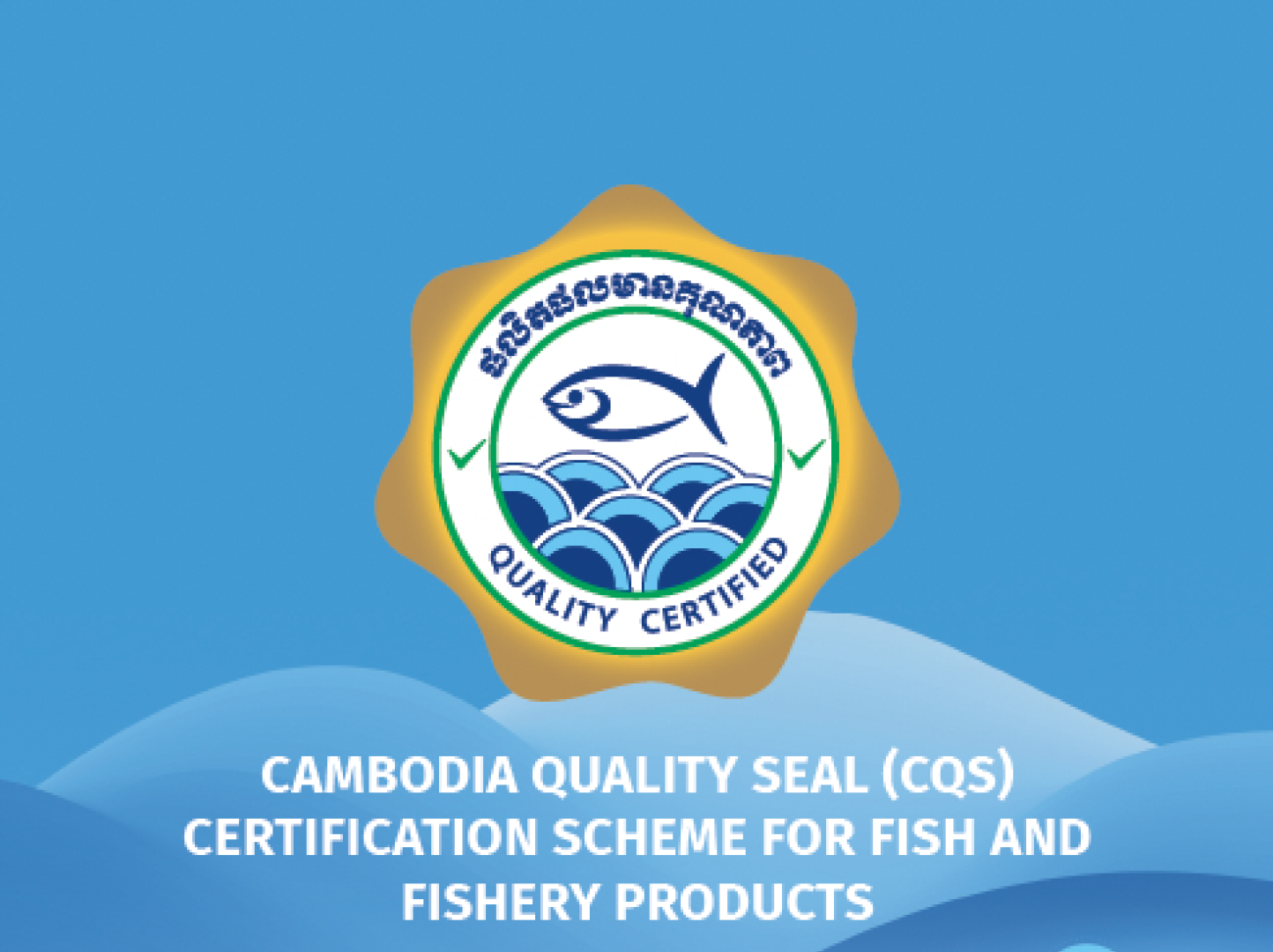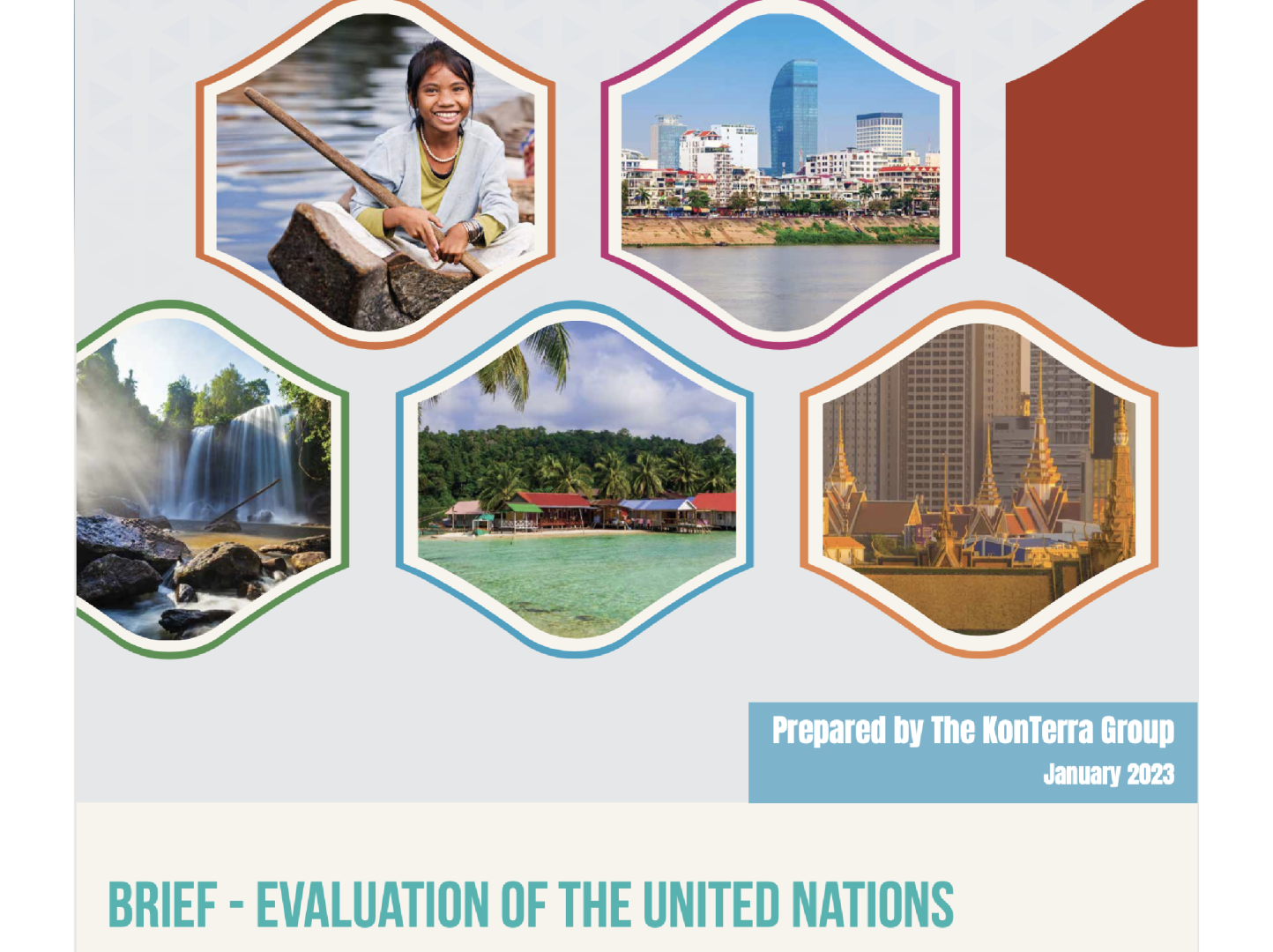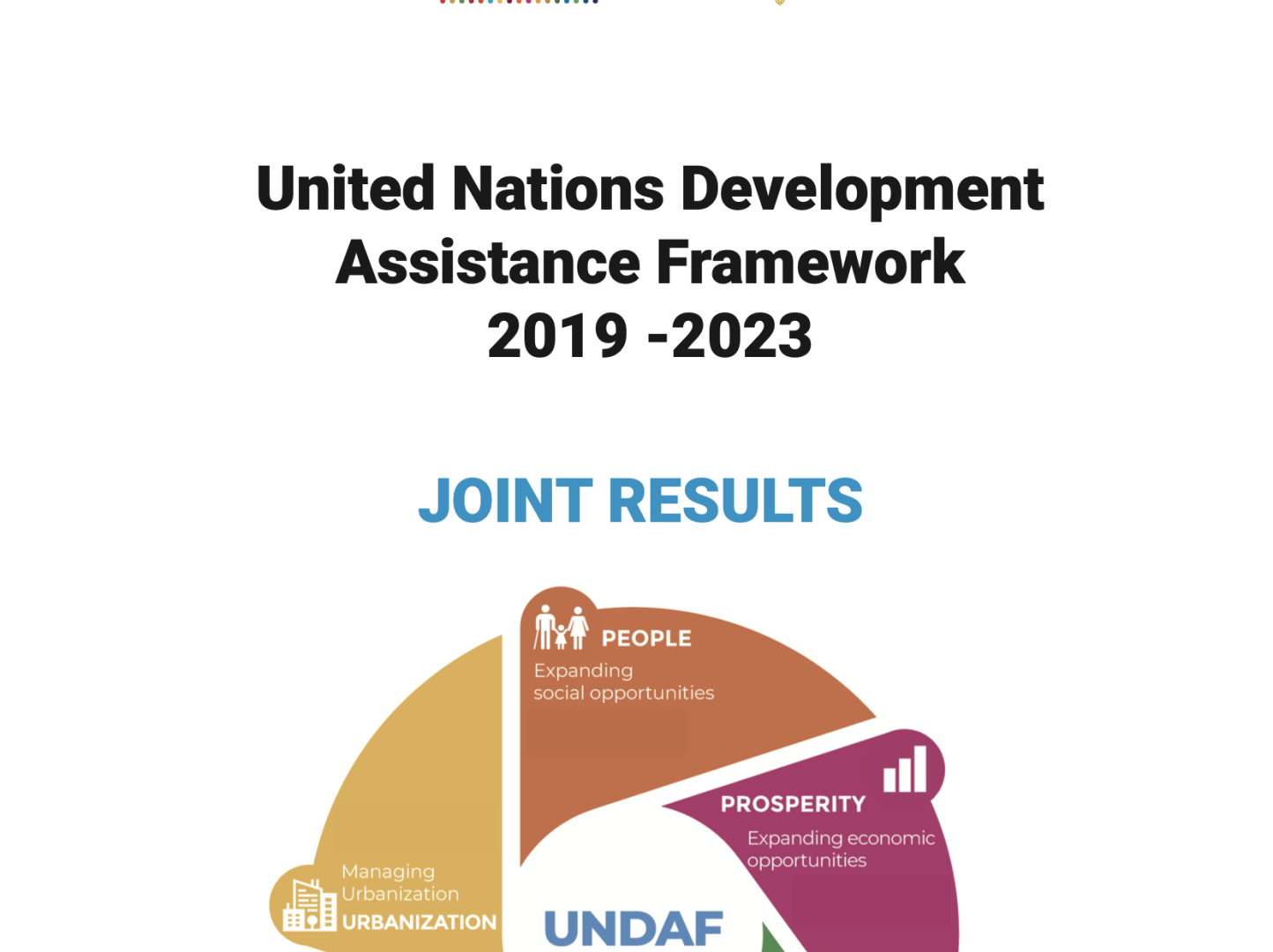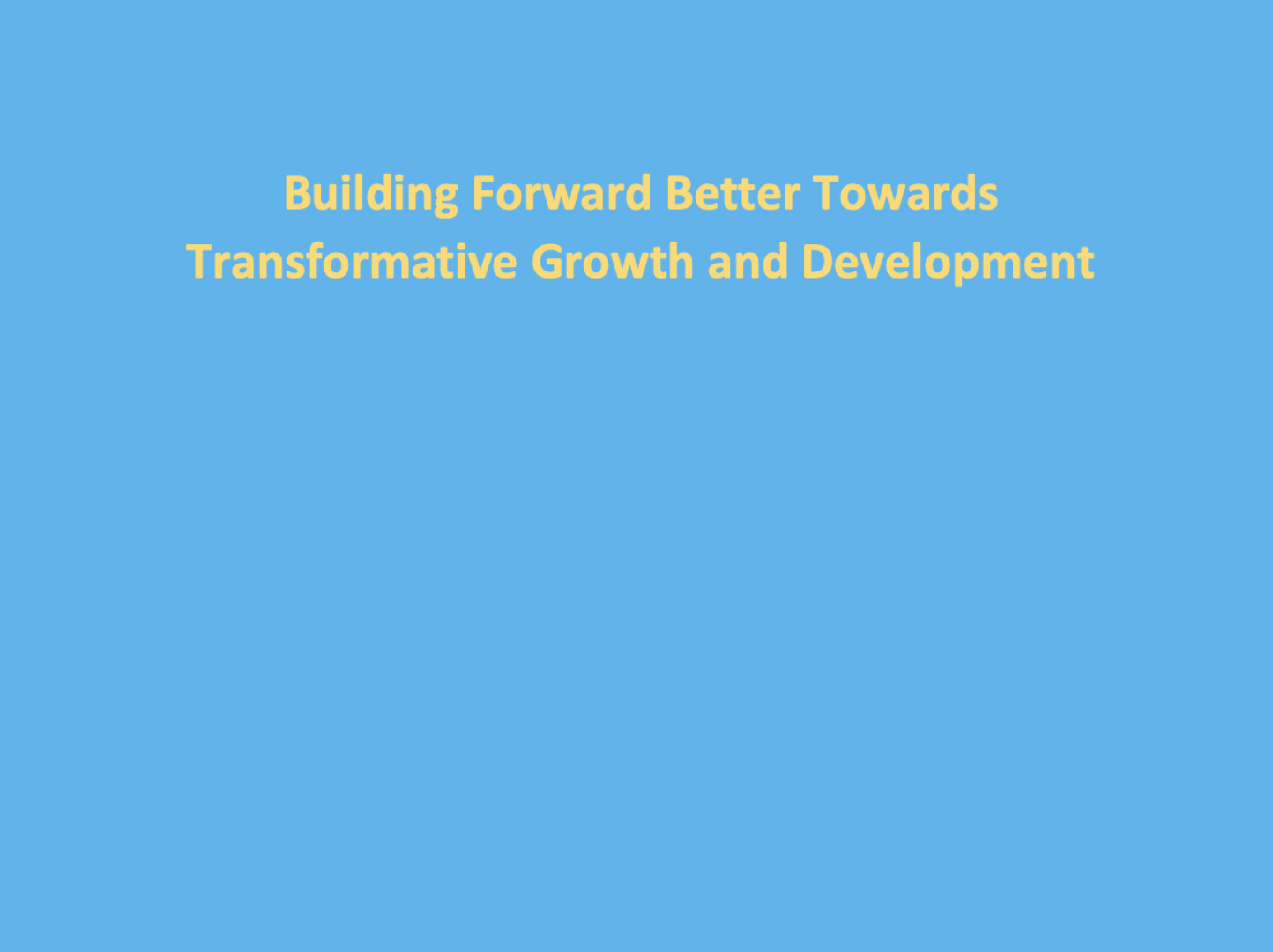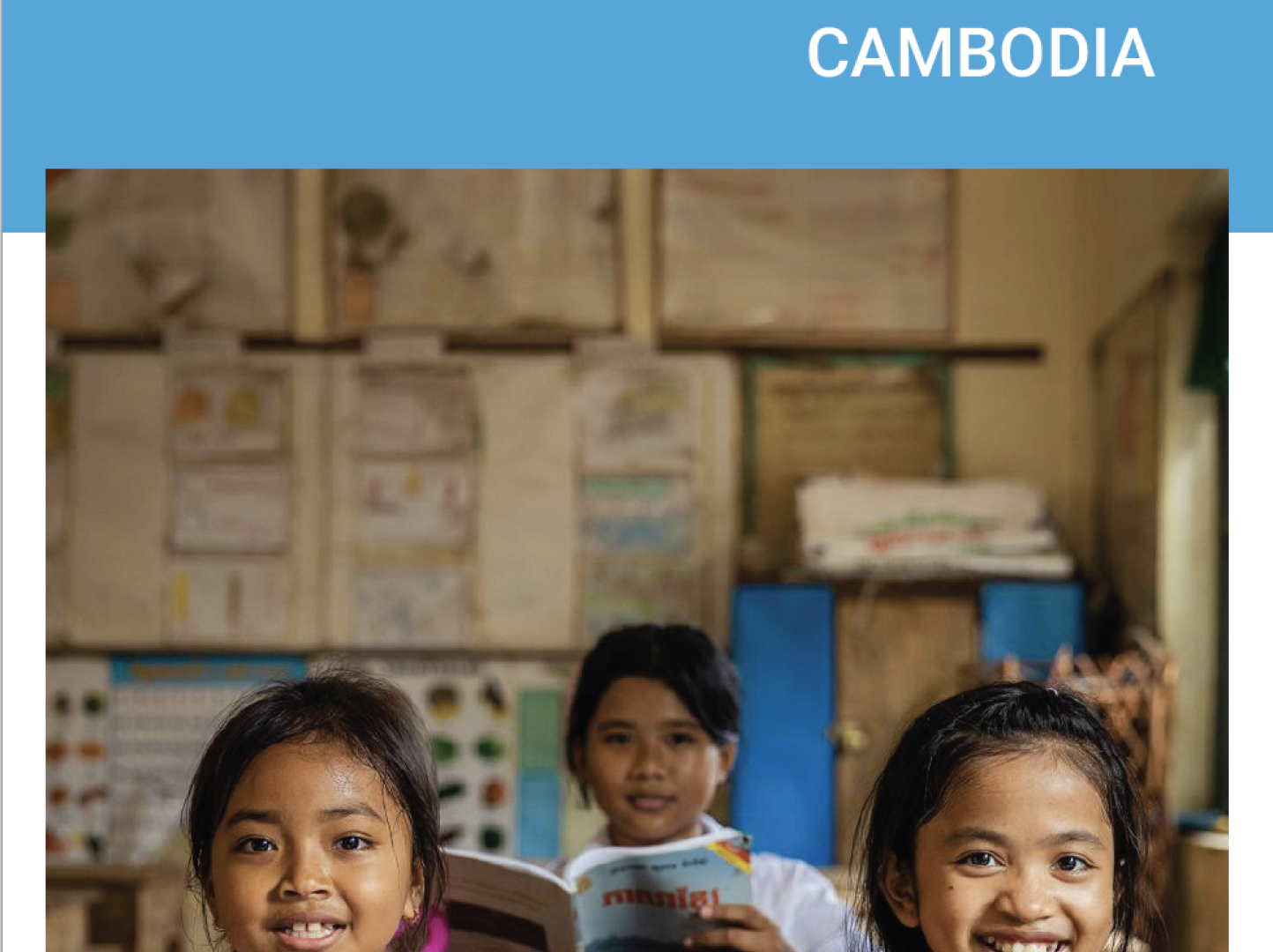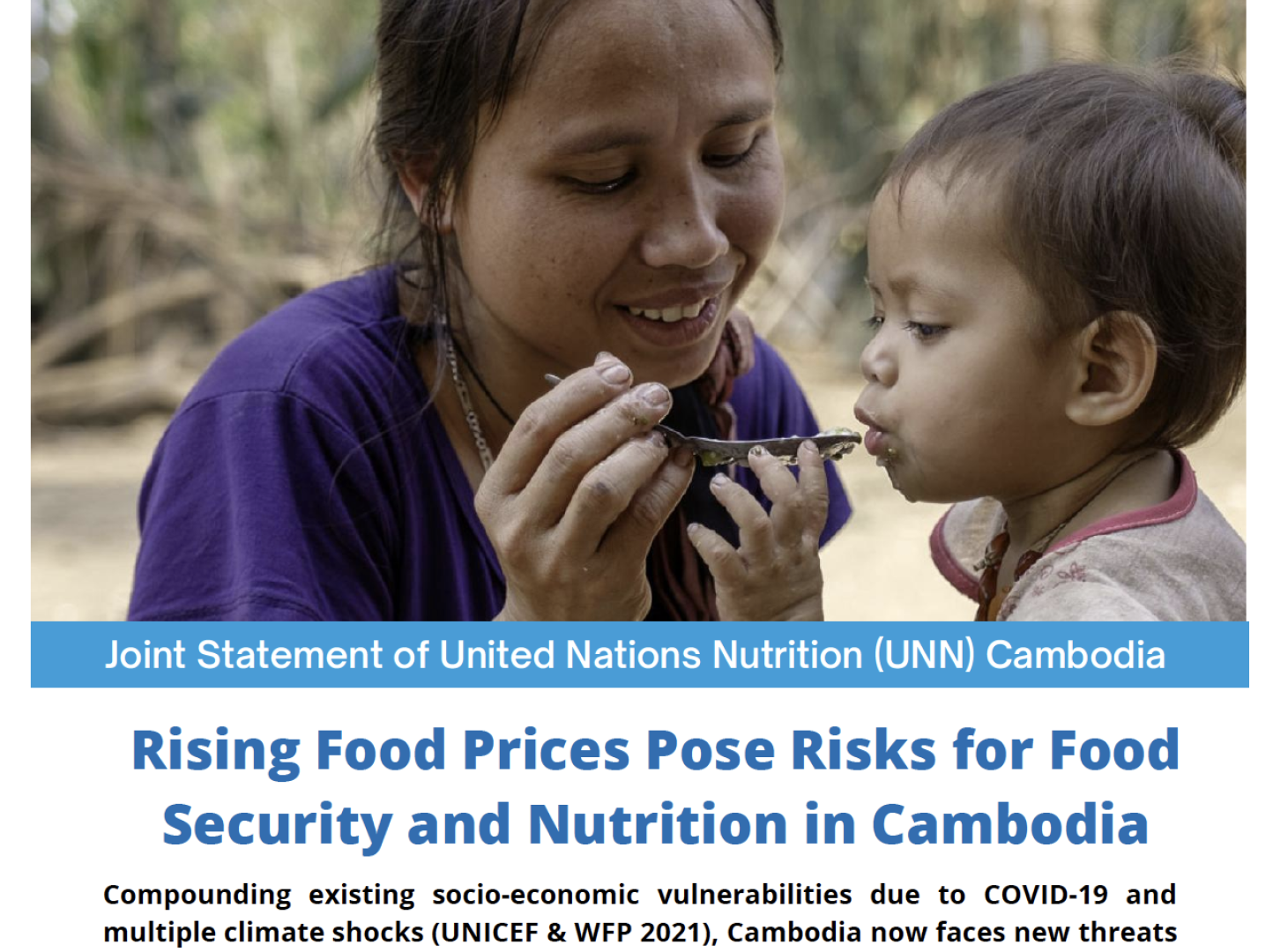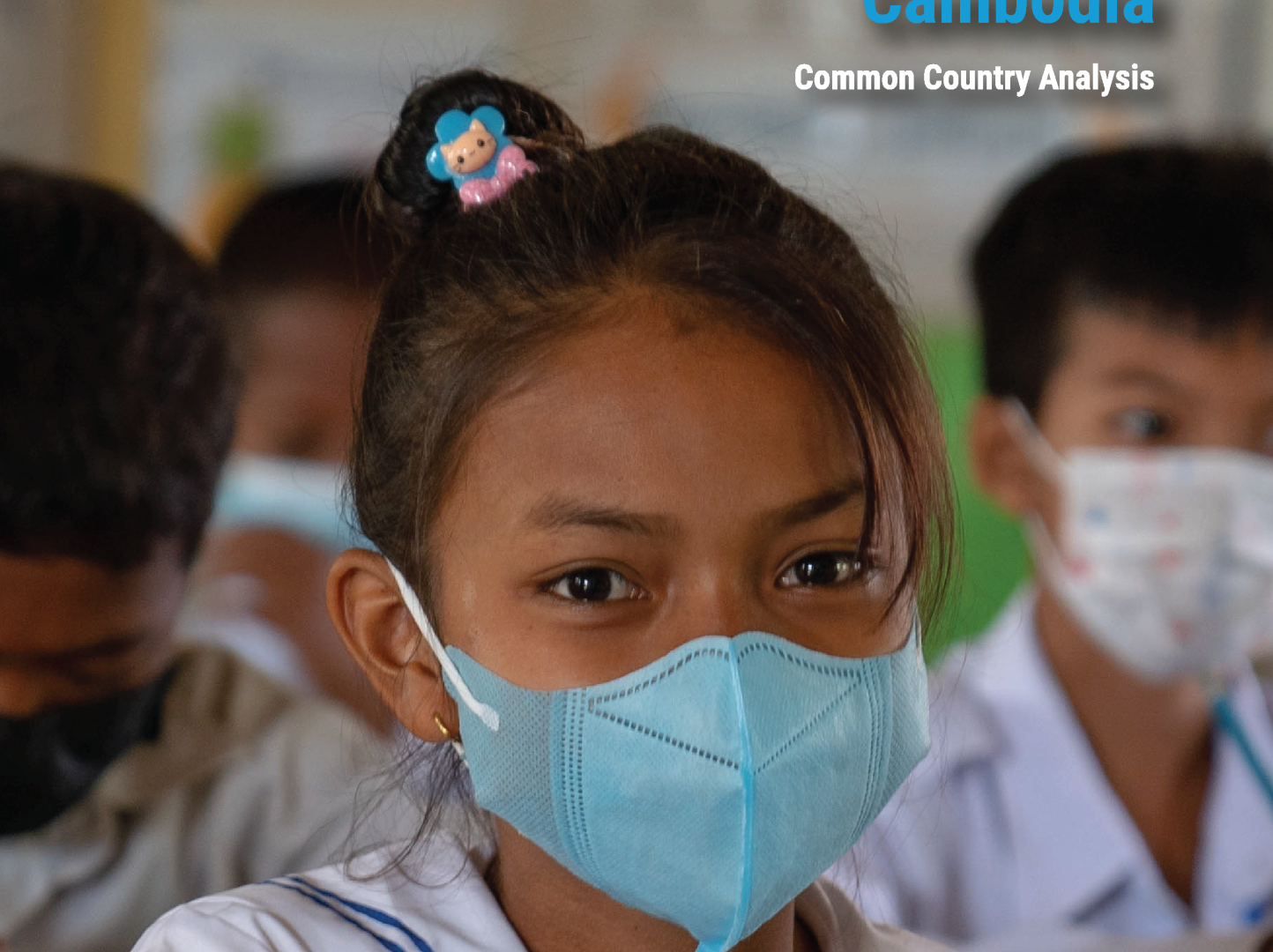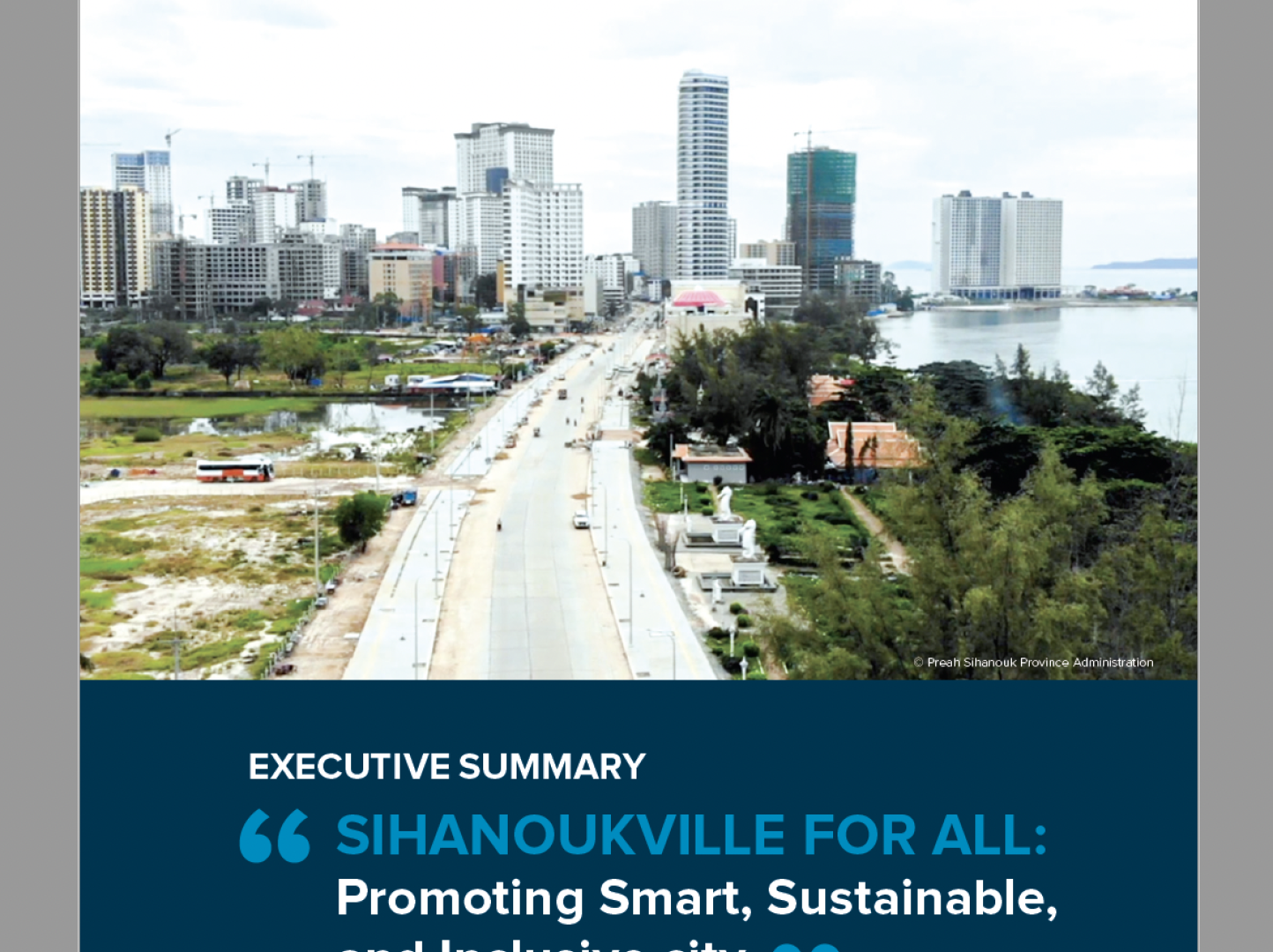Latest
Story
03 April 2024
Tipping the Scales for Gender Equality: The Inspiring Journey of Sophorn Someng Fish Processing Enterprise
Learn more
Story
08 March 2024
Sisters in Business: How a Women Fisheries Processing Group Is Helping Build Gender Equality
Learn more
Press Release
22 February 2024
Promoting Human Rights and Civic Spaces in Cambodia: OHCHR Launches New Project Cycle Supported by the European Union
Learn more
Latest
The Sustainable Development Goals in Cambodia
The Sustainable Development Goals are a global call to action to end poverty, protect the earth’s environment and climate, and ensure that people everywhere can enjoy peace and prosperity. These are the goals the UN is working on in Cambodia:
Press Release
10 November 2023
JOINT PRESS RELEASE: The Signing Ceremony of the United Nations Sustainable Development Cooperation Framework for Cambodia 2024-2028
The Cooperation Framework serves as the strategic document that provides guidance to the UN system at the country level, enabling the UN Country Team (UNCT) to effectively support the Royal Government of Cambodia in contributing to national development priorities as articulated in the Pentagonal Strategy – Phase I and making significant progress towards the Cambodian Sustainable Development Goals (CSDGs), LDC Graduation, and Cambodia’s vision 2050. The Cooperation Framework was formulated through a series of consultations between the RGC and the UN Country Team, in addition to consultations with development partners, civil society organizations, the private sector, and youth representatives. As a result, this Cooperation Framework 2024-2028 was endorsed, in principle, at the successful Validation Workshop on September 21, 2023.
A Joint Steering Committee, co-chaired by the Second-Vice Chairman of CDC and UNRC, will be established to monitor the implementation of this cooperation framework, provide strategic direction, and coordinate the implementation between relevant ministries/institutions of the Royal Government of Cambodia and all key stakeholders. While the signing of the framework marks a significant milestone, the success of this strategic development policy lies ahead in the implementation and requires active engagement by government institutions, sustained and inclusive partnership with development partners, civil society and the private sector; while its performance will be measured through a robust monitoring and evaluation framework. By prioritizing these key areas and fostering collaboration, meaningful results can be achieved while fulfilling the shared vision of progress and development in Cambodia.
Speaking at the signing ceremony, Dr. Senior Minister placed a high value on the Cooperation Framework 2024-2028 and believed that its implementation would make an essential contribution to Cambodia’s socio-economic development and accelerate the achievement of RGC’s priorities as articulated in the Pentagonal Strategy - Phase 1. He also highly commended the efforts of the UN Country Team in achieving past results and their continued support and close cooperation with the RGC under the leadership of Samdech Moha Borvor Thipadei HUN MANET, Prime Minister of the Kingdom of Cambodia.
“The Cooperation Framework that we sign today is the architecture through which the vital partnership between the United Nations and the Royal Government of Cambodia is strong and effective and ultimately supports a greener, more prosperous and fairer future for all people in Cambodia, ensuring that no one is left behind as the nation moves forward,” said Mr. Jo Scheuer, the United Nations Resident Coordinator.
In conclusion, Senior Minister Chhieng Yanara reaffirmed the CDC’s commitment to continuing to cooperate with the United Nations in Cambodia and line ministries and institutions, as well as all relevant stakeholders, to ensure the achievement of the stated outcomes as articulated in the Cooperation Framework2024-2028.
For further information, please contact:
Mr. Kry Sereirith, Acting Director, Department of Development Cooperation with the UN Agencies of CDCB/CDC via E-mail: kry.sereirith@crdb.gov.kh or Tel: 010 686 169.
Ms. Keo Sreysros, Programme Communications and Advocacy Officer of UNRCO, via E-mail: sreysros.keo@un.org or Tel: 011 885 766.
Read the United Nations Sustainable Development Cooperation Framework for Cambodia 2024-2028
1 of 4
Publication
10 November 2023
United Nations Sustainable Development Cooperation Framework 2024-2028
The United Nations Sustainable Development Cooperation Framework (Cooperation Framework) 2024-2028 represents a collaborative strategy between the United Nations and the Royal Government of Cambodia to address structural development challenges affecting the country and facilitate a pathway towards development. It outlines the key focus areas and interventions proposed by the United Nations, working in concert with a wide range of development actors to accelerate Cambodia’s progress towards the Sustainable Development Goals (SDGs).
1 of 4
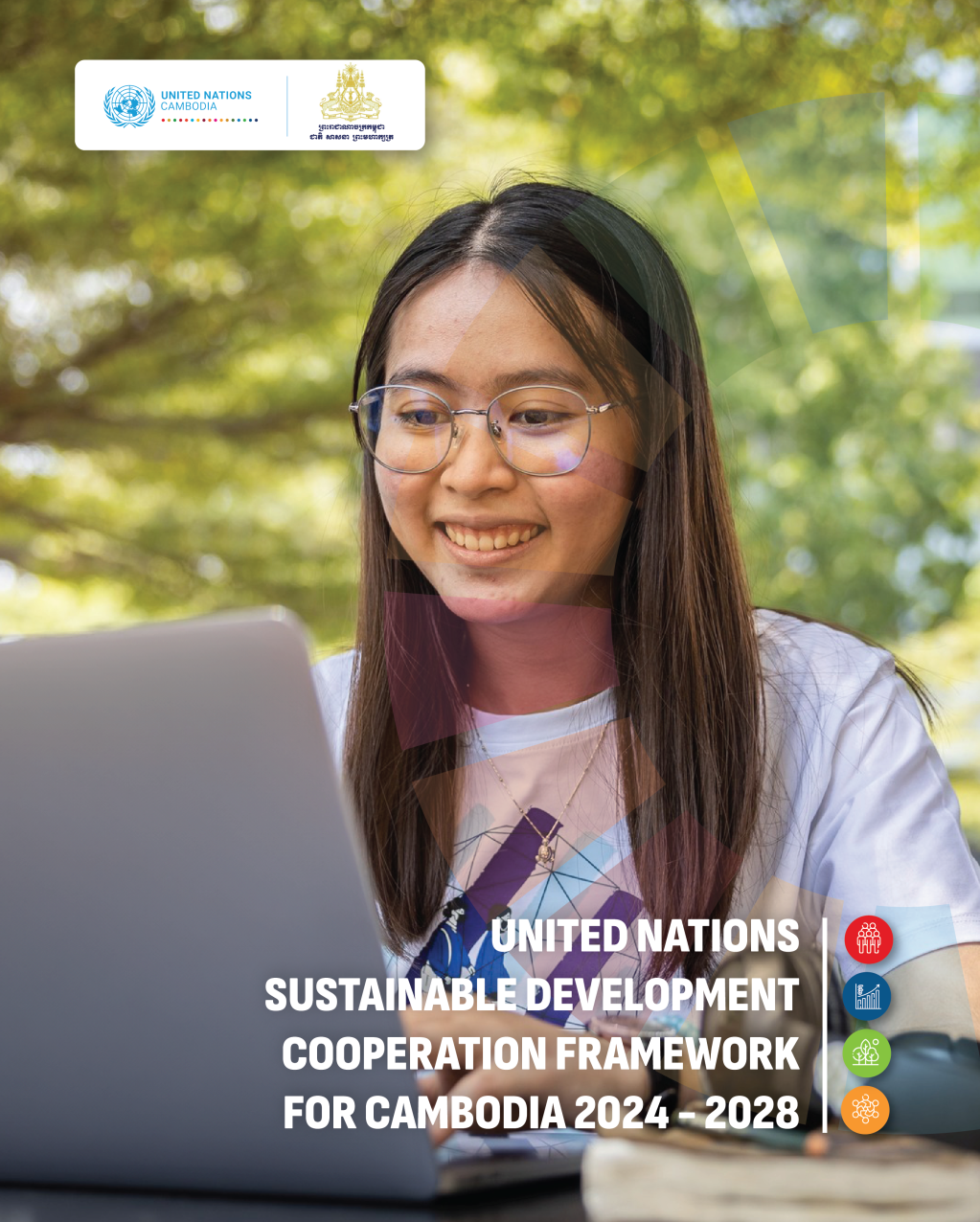
Story
25 April 2023
The Annual UN and Prime Minister Dialogue resumes: a commitment to strengthening human capital development and resilience in Cambodia
On March 28th, 2023, the Royal Government of Cambodia (RGC), chaired by Samdech Techo Prime Minister Hun Sen, convened the 6th Annual Dialogue with the United Nations Country Team, led by the UN Resident Coordinator, Mr Jo Scheuer.
The Annual Dialogue is a high-level platform to review and reflect on the joint contributions between the UN and the government, discuss national development priorities, including progress towards achieving Cambodia’s Sustainable Development Goals (CSDGs) and to strengthen cooperation between the Royal Government of Cambodia and the UN system.
During the dialogue, the UN Resident Coordinator updated the Prime Minister on joint progress in implementing the current UN Development Assistance Framework (UNDAF) 2019 – 2023 and the development of the new United Nations Sustainable Development Cooperation Framework (UNSDCF 2024-2028) to support the national strategic development plan and to address key SDG priorities and gaps.
The 2023 Annual Dialogue focused on 2 topics: (1) Strengthening Resilient Health System towards Universal Health Coverage (UHC) and (2) Expanding Coverage and Scope of Social Protection. The discussion focused on the Royal Government’s priorities and strategic directions for stronger resilient health systems towards Universal Health Coverage (UHC) and for developing and expanding the coverage of the social protection system that protects all people living in Cambodia, especially the poor and the vulnerable from life-cycle risks and shocks.
The UN in Cambodia reiterated the commitment to support the Royal Government’s priorities in strengthening resilient health systems towards UHC in strategic areas including preparing health systems for the next health emergency and pandemic and strengthening primary health care as the most cost efficient and equitable pathway to UHC.
On social protection, the UN highlighted the strategic approaches and the commitment to supporting the gradual expansion of the coverage, scope and quality of social protection to achieve a harmonized social protection system. The UN provides technical assistance to support policy development as well as support the expansion of social protection schemes including protection of the most vulnerable, the workers in both formal and informal economy, and health protection.
The UN looks forward to continuing to build our partnership with the Government, and to mobilize collective efforts to support the Government’s priorities to accelerate the SDGs. The UN will continue to coordinate closely with relevant counterparts in the Royal Government of Cambodia in taking forward the recommendations and actions discussed during the dialogue.
Opening Remarks by Mr Jo Scheuer, UN Resident Coordinator
1 of 4
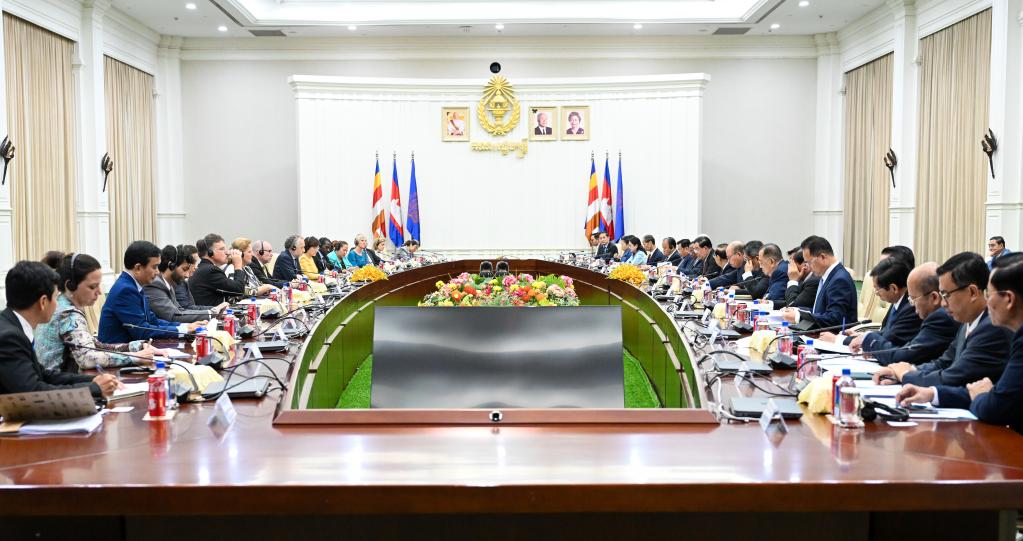
Publication
12 July 2023
Annual Results Report 2022 Cambodia
Throughout the year, the United Nations (UN) in Cambodia continued to work in close partnership with the Royal Government of Cambodia, building capacities and providing technical assistance to support the country’s progress towards its national development objectives and the 2030 Agenda for Sustainable Development and Sustainable Development Goals (SDGs). Despite the unprecedented challenges presented concurrently by the COVID-19 pandemic, the food and energy crisis, and global tensions, Cambodia has demonstrated immense resolve and emerged both with lessons learned and strengthened systems to face forthcoming hindrances to its development goals. Together with the Government, the United Nations (UN) in Cambodia has strived to reduce vulnerabilities with the aim to leave no one behind, and to increase sustainability to ensure Cambodia is able to withstand future shocks related to climate change, public health, and other challenges. Although the impacts of the COVID-19 pandemic have lingered, we have witnessed Cambodia’s remarkable resilience and capacity to rapidly recover. Shifting from the initial emergency phase to the sustained management of COVID-19, in 2022, the UNCT supported the Government to draw on lessons learned from the pandemic to improve preparedness, response, and resilience to future shocks. These lessons learned have been adapted into our joint priorities and planning for the year ahead.
1 of 4

Story
03 April 2024
Tipping the Scales for Gender Equality: The Inspiring Journey of Sophorn Someng Fish Processing Enterprise
Women make up most of the workforce in the processing and trading of fisheries products, but their vital roles often go unrecognized, and gender inequalities stop them from fulfilling their potential—and hence the potential of the whole sector. Given how important post-harvest fisheries are in Cambodia's development, such inequalities are a drag on the country's prospects. The United Nations Industrial Development Organization (UNIDO), in collaboration with Cambodia's Fisheries Administration (FiA), is helping balance the scales with its CAPFISH-Capture: Post-harvest Fisheries Development project, which empowers women all along the value chain. One of the participating businesses is the family-owned Sophorn Someng Fish Processing Enterprise in Kampong Thom, Cambodia. Established in 2011 as Soung Sophorn Dried Fish Enterprise, reflecting the husband's name, the business transformed with support from the CAPFISH-Capture project, co-funded by the European Union (EU). Thanks partly to food safety training and financial assistance for facility upgrades, the enterprise obtained the coveted food safety certification (CQS Basic). The enterprise attracted potential partners, including a supermarket chain seeking product registration and barcoding. Then, in 2023, after gender equality and leadership sessions by the project, some big changes took place. For one, the business was renamed Sophorn Someng Fish Processing Enterprise after the couple's names to highlight the shared ownership of Ms. Someng and Mr. Sophorn.On a deeper level, Ms. Someng recognized the importance of continuous learning and skills development. From her mother, she had inherited a knowledge of the traditional methods of fish processing and a passion for the trade. However, as a woman in society, she did not have the same opportunities as her male peers. Like other women, she had family care responsibilities that left less time for business. With the gender equality sessions, that began to change. Ms. Someng now assumes her responsibilities, for example, the financial management of the business, with more self-esteem and knowledge. “We have divided clear roles and responsibilities between my husband and me; I am responsible for the financial and operational management while my husband is in charge of external roles such as marketing and promotion and market linkages,” says Ms. Someng. Ms. Sokmeng shared her newfound knowledge with her staff, fostering awareness about domestic violence, promoting women's rights and co-responsibility for household chores among workers.She adds, "Encouraging equitable distribution of business and household responsibilities within a family can foster women's empowerment by enabling them to acquire and hone their skills and abilities."The impact of this investment extended far beyond the enterprise itself. The company's initial products were distributed to local markets, but soon, the production grew from a modest 500kg to an impressive 2,500kg per month, and the quality of Sophorn Someng dried fish products elevated, fostering newfound trust among clients, generating better revenue and delivering safer products to low-income markets. The enterprise has also created new jobs and increased income for value-chain suppliers and staff. This has helped their suppliers and workers be better able to send their children to school, contributing to a healthier and more equitable supply chain. In a fast-changing business landscape, Sophorn Someng Fish Processing Enterprise serves as an inspiration, challenging gender stereotypes and paving the way for a more inclusive and prosperous future in the fish processing industry. It is a lesson that other industries will learn from.
1 of 5
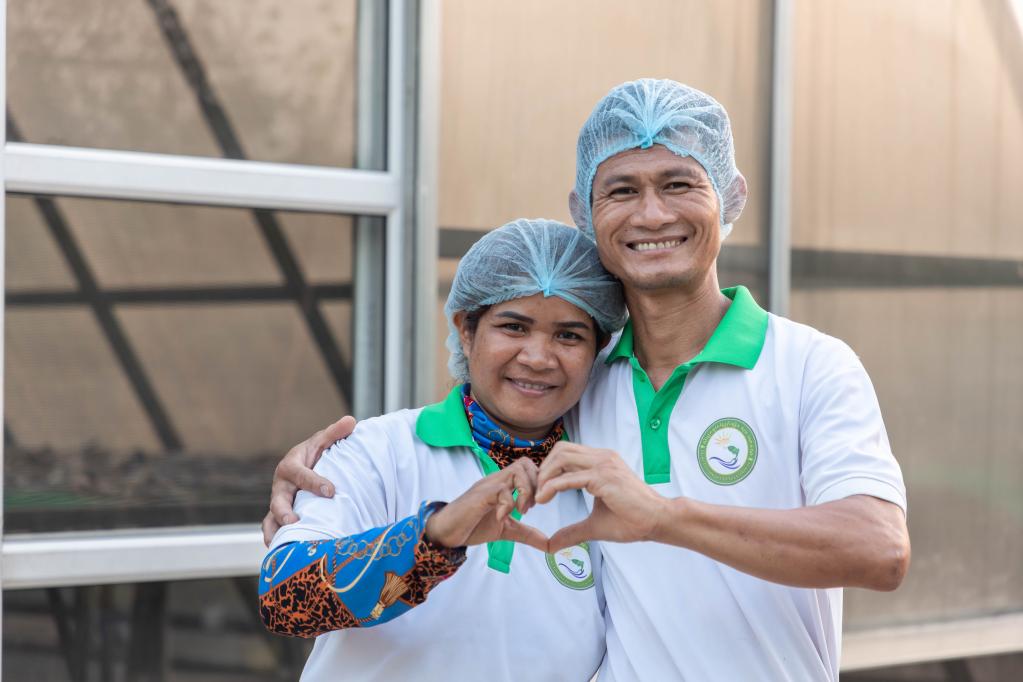
Story
08 March 2024
Sisters in Business: How a Women Fisheries Processing Group Is Helping Build Gender Equality
Years ago, as a young woman, Ms. Bun Vang learned from her mother the secrets of crafting culinary delights from the products of the sea. Later, her mother-in-law shared her own recipes and cooking style.Then, in the Peam Krosoab Community in Kok Kong, it became Ms. Bun Vang's turn to continue the tradition, adding her own special ingredients. She started a family enterprise of dried shrimp processing. In time, with skills learned from experiences in Thailand and multiple training sessions, Ms. Bun Vang transformed her family's modest endeavour into a thriving dried shrimp business. With the aim to empower the women in her community, she founded the Peam Krosoab Women Fisheries Processing Group in 2014.The reasons for the group were various. Many women in the community solely relied on their husbands' fishing income, facing financial challenges that sometimes led to domestic violence. Ms. Bun Vang envisioned the group as a means to create income-generating opportunities, enhance livelihoods, and build self-reliance for women.The group, consisting of nine dedicated members, has become key in shaping the community's economic landscape. Each member plays a crucial role in the processing chain, from washing and boiling to packaging and marketing. Their main products—dried shrimp, dried squid, and shrimp paste—are crafted with precision and reflect the unique qualities of the local shrimp.Ms. Bun Vang's commitment to learning and improvement led the group to secure technical and financial support from various institutions. With guidance from the CAPFISH-Capture: Post-harvest Fisheries Development project, the group received training in business management, digital marketing, and food safety. "Women are often burdened with household chores, but it's important that we make time to learn new skills and stay up-to-date with new technology, which is crucial for the growth of our businesses," says Ms. Bun Vang.Co-funded by the European Union (EU), the project is implemented by the United Nations Industrial Development (UNIDO) and Cambodia's Fisheries Administration (FiA); its financial support helped them acquire a solar dryer dome, making the business more efficient at processing dried shrimp. The CAPFISH-Capture project actively promotes gender equality by integrating it into the project's activities and empowering women throughout the post-harvest fisheries value chain.The impact of the Peam Krosoab Women Fisheries Processing Group extends beyond economic empowerment. By creating jobs for seven families, the group has elevated the community's confidence and reduced instances of domestic violence. Members can now access finance through savings groups, ensuring better education for their children and improved household conditions. Harnessing the collective power of women working together in networks and supporting one another could serve as a transformative force, tackling these gender inequalities and unlocking significant benefits across the entire value chain.Ms. Bun Vang acknowledges that the journey is ongoing. Even as the group faces challenges such as raw material shortages due to unfavourable weather conditions, Ms. Bun Vang remains optimistic. She believes in the unity and resilience of the group. "As women," she adds, "we should have our own businesses to create our own source of income, build self-reliance, and improve decision-making in the family."
1 of 5
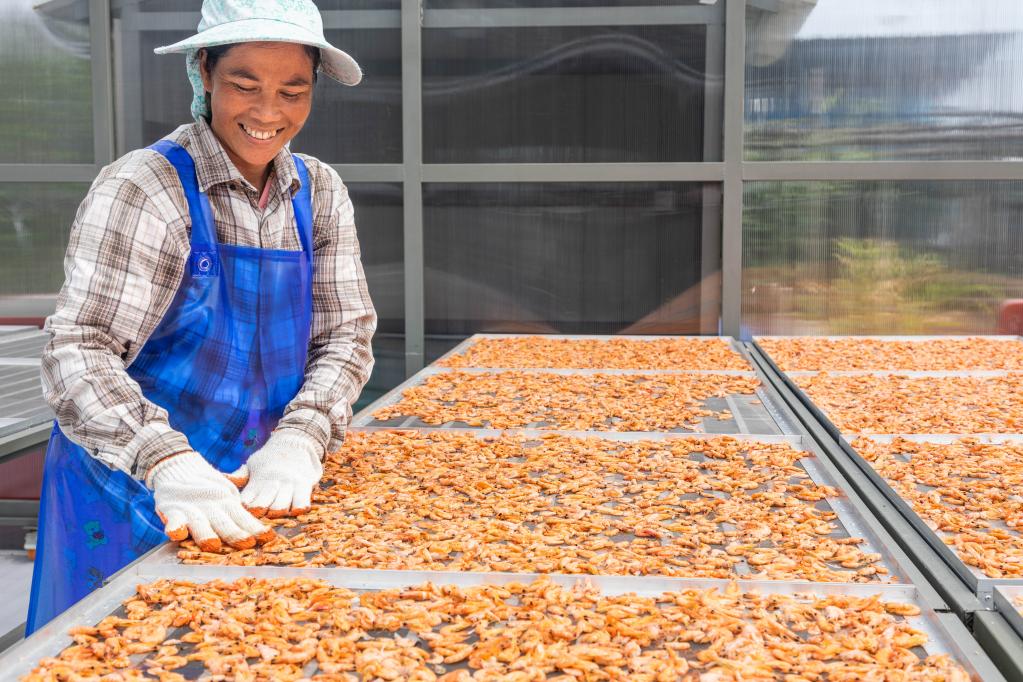
Story
21 December 2023
Agents of Change: 16 Days event in Phnom Penh
Youth take actions every day to positively transform themselves into better individuals and leaders, fostering a more equal, inclusive world. This year’s on Human Rights Day in Cambodia, two youth movements united to powerfully demonstrate the power of youth as catalysts for change.
On December 10 in Phnom Penh, two influential Cambodian youth movements, Breakthrough and Love is Diversity, united to spotlight the innovative youth projects dedicated to advancing gender equality and inclusion in Cambodia.
Huy Sambath, one of the founders of the Breakthrough movement, explains, "This year, for 16 days, we decided to collaborate with Love is Diversity and other youth initiatives. Together, we are all working to challenge social norms and discrimination that lead to gender-based violence. This solidarity shows how youth, especially young women, can lead the way when it comes to ending gender-based violence.
Aligned with the 2023 global theme "UNiTE! Invest to prevent violence against women and girls," the event featured seven youth networks, predominantly founded by young women. These included Art and Mental Health, Code for Girls, SEED Cambodia, Young SEAkers Cambodia, Techno Beverages, Baykork, and RULErs. During the event, organisers emphasized the importance of supporting and investing in youth groups that are working to promote gender equality as a crucial step towards ending violence against women and girls.
“Our aim was to stage an event where we could collectively showcase our commitment to ending gender-based violence and elevate the work of other youth groups. Investment in prevention doesn't only mean money but also our time and effort,” said event organiser and Breakthrough co-founder Van Chankanha.
Breakthrough and Love is Diversity are both movements igniting change across Cambodian society; Breakthrough is a feminist media movement promoting women's empowerment through storytelling, while Love is Diversity champions LGBTQ+ rights through social media, community engagement, and advocacy at all levels. Initially supported by UN Women Cambodia, both Breakthrough and Love is Diversity have evolved into entirely self-sustaining youth groups.
Breakthrough co-founder, Ung Rongphaltevy, sees that mobilising youth as agents of change is vital to address violence. ‘Events like these remind us that youth can make a difference. By raising our voices and acting, we fuel the movement to end gender-based violence, and invest in that future, and be the change we want to see’.
The event showcased a diverse array of art and photo exhibitions, films, and powerful first-person storytelling that highlighted the experiences of youth, people with disabilities, and the LGBTIQ community. Emphasizing the importance of adopting an intersectional perspective when addressing gender-based violence, it featured Kuy Thida, the founder of the Love is Diversity, who shared his personal story: “When I was young, I had a dream—to be able to be myself. As a member of the LGBTQ+ community, the first challenge is within me. I hope Love is Diversity can continue to be a safe space for LGBTQ+ individuals to be themselves."
With a turnout of 100 participants from diverse backgrounds, including a significant number of youth and representatives from the British Embassy, various civil society organizations, and the Cambodian Ministry of Women's Affairs, the event gained broad support.
In addition to the art and exhibitions, there was an LGBTIQ fashion show, interactive youth panel discussions, performances, and film screenings. These left participants, such as Bona Maryneth, feeling inspired. She expressed, “The event left me with a voice calling for an end to violence against women and girls still humming in my heart. It made me feel like it's something we must fight for now.”
Participant Moeurn Sreyka echoed this sentiment, saying, “This event both impressed and moved me; the LGBTQ+ themed fashion show made me emotional. I was delighted to be a part of it.”
The occasion also marked the 3-year anniversary of the Breakthrough movement. A moment was taken to reflect and celebrate their accomplishments, including hosting numerous large-scale film events, conducting film and storytelling workshops for youth, organizing roadshows across Cambodia, and producing over 40 films.
Van Chankanha remarks, "I couldn't be prouder of what we've accomplished. Three years ago, we decided to stand up against social norms, not just for ourselves but for all women. It takes courage and opportunity to challenge the status quo. Here's to breaking barriers and empowering women everywhere!"
Looking ahead, future events for both movements include a Breakthrough film festival, campaigning for marriage equality, and continuing to emphasize that a future free from violence against women starts with us. As Breakthrough co-founder Kong Raksmey says, “We need to unite and invest to prevent gender-based violence. Be true to yourself, dare to challenge, dream, decide, and breakthrough. Brave voices pave the way for a violence-free and more peaceful world.”
Explore more about Breakthrough by visiting their website and stay connected with their impactful movement here.
For the latest updates on the Love is Diversity movement, follow their journey here.
1 of 5
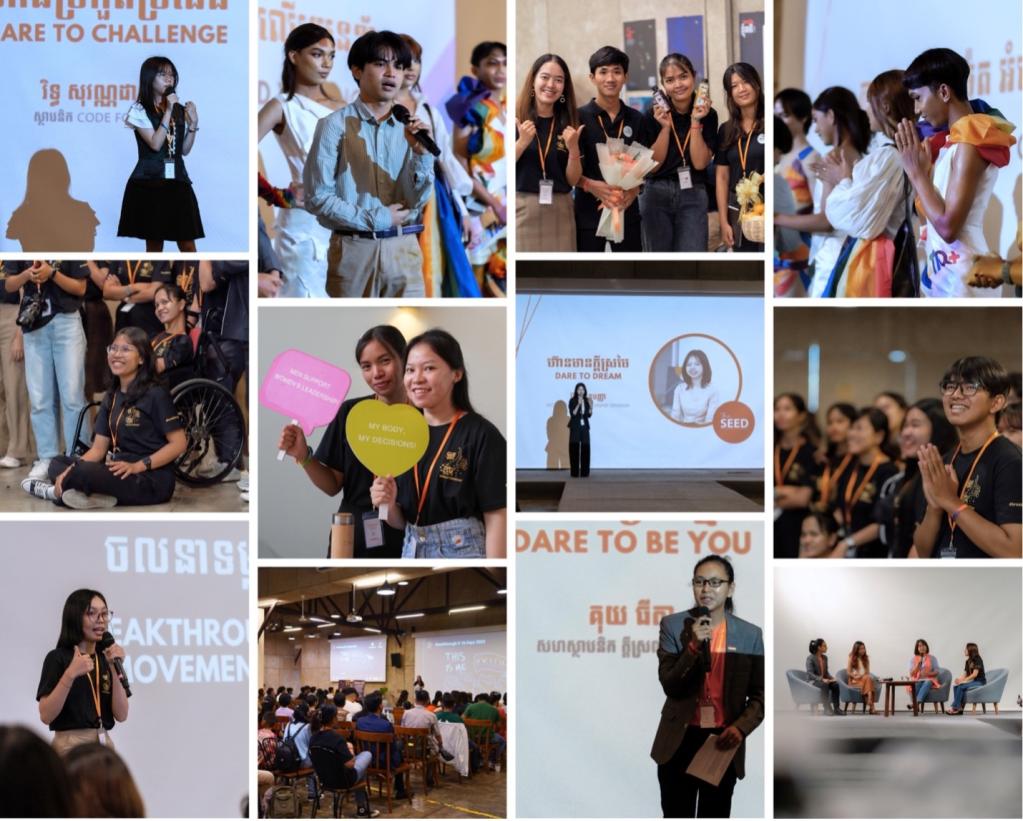
Story
02 December 2023
Joint Op-Ed: Empowering Communities: A Transformative Force in Cambodia's HIV Response
December 1 is the 35th anniversary of World AIDS Day, an opportunity to reflect on Cambodia’s dramatic progress in addressing HIV/AIDS, particularly over the past decade, and recognize the work that remains to end the disease as a public health threat. We also remember and honor the heroic efforts of those on the frontlines of the national response, notably the transformative role that community-led organizations play.
Community organizations are led by real people. Meet Vorn Vy, a resilient Cambodian woman whose dream of becoming a teacher expanded into a leadership role in the Kingdom’s efforts against HIV/AIDS.
Originally inspired by a local health NGO in action at her workplace, Vy envisioned joining the effort by sharing her own experience living with HIV to help educate fellow female entertainment workers on prevention. Despite coming from poverty and dealing with health complications, she persevered, becoming a leader in the Battambang District Forum of Networks of People Living with HIV and Most-at-risk Populations (DFoNPAM). This forum connects individuals living with HIV and those vulnerable to HIV transmission such as female entertainment workers, men who have sex with men, and transgender women, all of whom often face discrimination and barriers in accessing healthcare.
Vy’s role has expanded and she now helps create safe spaces where people can openly discuss their lives, concerns, and health without fear. She also works to educate people about HIV testing, prevention, and treatment, while helping to eliminate fear and self-stigma by advocating for better healthcare and social protection for rural communities. In Cambodia, where nearly 76,000 individuals are living with HIV, people vulnerable to HIV transmission face persistent misconceptions, stigma, and discrimination, making them less likely to access information about how to prevent HIV/AIDS or to seek HIV testing, delaying the start of lifesaving treatment. Vy's advocacy reaches the heart of these issues, emphasizing the need for support, particularly for key populations.
Cambodia has made substantial progress in its HIV response due to community-led initiatives like Vy’s, bolstered by the support of the Royal Government of Cambodia and partners like UNAIDS, the Global Fund, and the U.S. President’s Emergency Plan for AIDS Relief (PEPFAR). Community and civil society organizations like DFoNPAM have been instrumental in challenging harmful laws, combating stigma, and advocating for policies and services that improve access to HIV services while advancing human rights.
Community mobilization efforts have empowered thousands of people in Cambodia to amplify awareness on HIV prevention and reach more people with testing and treatment. A surge in HIV self-testing – 6,598 tests conducted in the past three months compared to 1,241 in the last quarter of 2022 – reflects strong peer and community engagement. Since 2019, community outreach has helped more than 13,000 individuals in key populations start pre-exposure prophylaxis (PrEP), a pivotal step in preventing new HIV infections.
Despite dramatic progress, ending HIV/AIDS as a public health threat in Cambodia requires sustained commitment. While an estimated 86 percent of people in Cambodia living with HIV know their status and can access treatment, too many remain unaware. Persistent misconceptions, harmful societal norms, and gender inequalities foster stigma and discrimination and fuel new infections. Ending this cycle entails redoubling the national response at all levels to reach those most vulnerable to exposure of HIV infection with information about HIV prevention and provide appropriate, respectful services.
Today, on World AIDS Day, let us remember Vy’s story and those of other courageous front-line community organizers. And let us not forget those we still need to reach. Government authorities, development partners, and civil society organizations must continue to invest and champion community leadership in the national HIV response. Cambodia has achieved so much in this historic national effort, and now has the potential to be a leader in Asia and around the world through innovation in supporting community-led responses. As long standing partners invested deeply in the Cambodian people, we remain committed to this historic global effort to end HIV/AIDS.
1 of 5
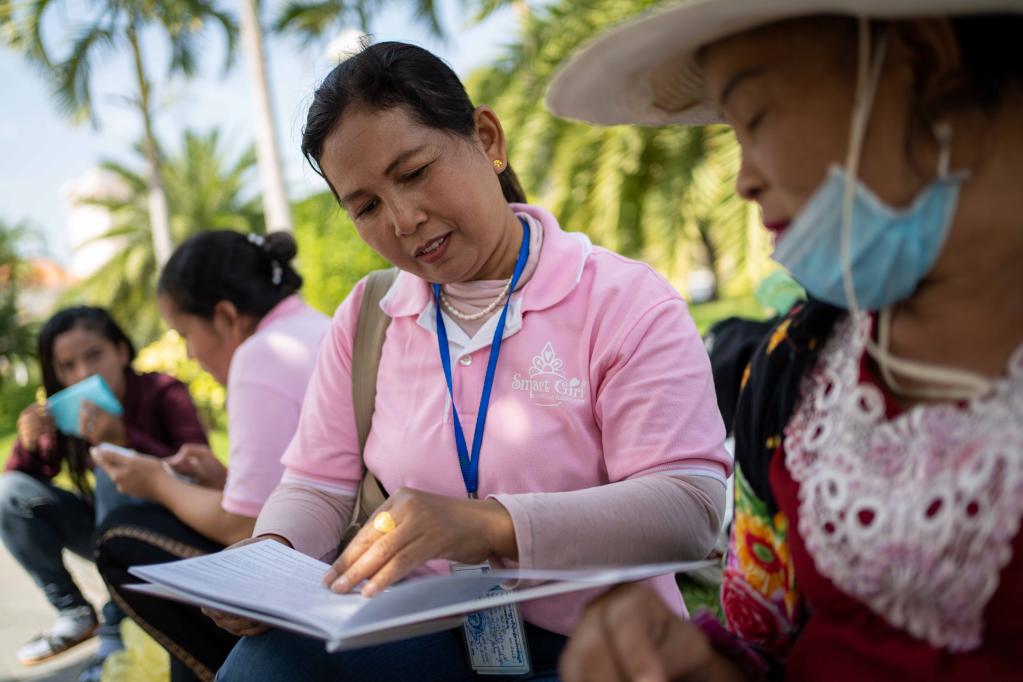
Story
25 September 2023
Government and UN Country Team Validate the United Nations Sustainable Development Cooperation Framework 2024-2028
On 21 September, the Council for the Development of Cambodia (CDC) and the United Nations Country Team (UNCT) in Cambodia co-organized a successful validation workshop on the new United Nations Sustainable Development Cooperation Framework (UNSDCF) 2024-2028. The workshop was attended by approximately 100 Secretaries of State, Undersecretaries of State, Technical Officials from across the Royal Government of Cambodia (RGC), and representatives of the UNCT in Cambodia.
Co-chaired by His Excellency Chhieng Yanara, Senior Minister and Second Vice-Chairman of CDC, and Mr Jo Scheuer, the UN Resident Coordinator in Cambodia, the workshop endorsed the UNSDCF 2024-2028 and confirmed the full alignment of its priority areas with the Royal Government of Cambodia's priorities as articulated in the Pentagonal Strategy - Phase I.
The new UNSDCF has four priorities – Human Development, Economic Transformation, Environment, and Social Transformation, and aims to support the Royal Government of Cambodia in advancing its development priorities and accelerating progress towards achieving all Sustainable Development Goals in Cambodia. The Cooperation Framework (CF) have been designed through a consultative process with actors from the Royal Government of Cambodia, civil society organizations, academia, development partners and the private sector. The four strategic priority areas are built upon a commitment to inclusive, people-centred, and human rights-based development. They are driven by a firm resolve to enhance resilience, sustainability, and accountability while ensuring no one is left behind. In addition, the new UNSDCF has integrated the six Global High Impact Initiatives - transforming education, food systems, energy compacts, social protections & jobs, biodiversity & nature, and digital transformation, and data dividend and gender-based violence, to accelerate the SDGs in Cambodia.
"The UNSDCF 2024-2028 is a crucial document for the UN system, serving as a vital instrument for planning and executing development activities at the country level. It also plays an essential role in the UN's reform agenda by bringing together different UN entities, including specialized agencies, funds, and programs, to work in a coordinated manner, leveraging their respective expertise and resources in driving sustainable development and improving the lives of Cambodian people. As the representative of the UN Country Team in Cambodia, I would like to reaffirm our unwavering commitment to working alongside the Royal Government of Cambodia and other stakeholders, as we collectively identify and address the challenges faced by Cambodia," reiterated Mr Scheuer.
“The UNSDCF 2024-2028 represents the UN’s commitments to Cambodia in socio-economic recovery, realizing the SDGs, smooth graduation from Least Developed Country. We highly value the partnership and trust between the Royal Government of Cambodia and the United Nations” said His Excellency Senior Minister.
In addition, the workshop participants engaged in valuable discussions surrounding the significance of inter-sectoral coordination, financing and partnership strategies, investment in data and statistics to support the implementation of the UNSDCF, as well as the crucial role of the UN in convening multi-stakeholders to come together addressing complex social challenges and fostering collaboration towards common goals.
The official signing of this strategic document between the UN system and the Royal Government of Cambodia will be by the end of October.
1 of 5
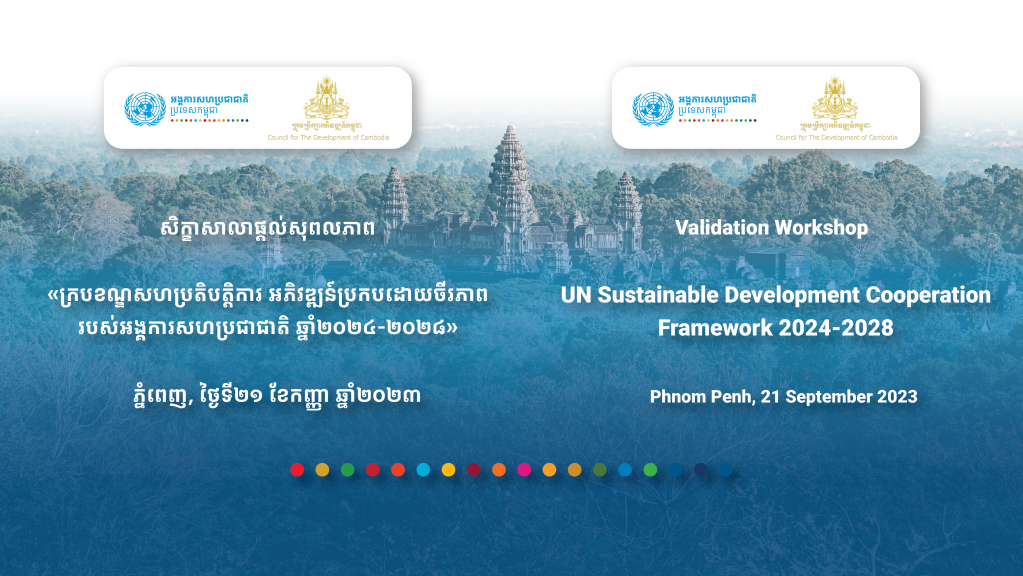
Press Release
22 February 2024
Promoting Human Rights and Civic Spaces in Cambodia: OHCHR Launches New Project Cycle Supported by the European Union
In its ongoing commitment to advancing human rights, OHCHR Cambodia offers technical advice to national institutions based on human rights assessments, conducts capacity-building programs for governmental and civil society actors, and collaborates closely with the United Nations Country Team and other partners to integrate human rights principles into efforts supporting sustainable peace and inclusive development in Cambodia. Additionally, the Country Office continues to assist the Government in meeting its obligations under international human rights law. Aligned with OHCHR global strategy and the United Nations Secretary-General's reform agenda, the Country Office adopts a 'people-centric' approach, focusing on the needs of individuals and communities in vulnerable situations. Guided by the 2030 Agenda for Sustainable Development and the imperative of 'Leaving No One Behind', the office advocates for human rights, particularly under Sustainable Development Goals 5 Gender Equality and 16 Peace, Justice and Strong Institutions. Moreover, it collaborates with the Government in preparing submissions to treaty bodies and participating in reviews under the Universal Periodic Review. European Union Ambassador to Cambodia, Igor DRIESMANS, stated the commitment of EU to human rights as a cornerstone of its agenda, both domestically and internationally. The EU substantial contribution of EUR 1.5 million for 2024–2026 underscores its dedication to promoting and safeguarding human rights in line with international legal standards, aiming to foster a more peaceful and sustainable society. Central to OHCHR strategy is enhancing partnerships with governmental entities, academia, and civil society organizations. The Country Office will focus on raising awareness about international human rights mechanisms, and addressing human rights violations affecting marginalized groups, including Indigenous peoples, LGBT individuals, persons with disabilities, women, and youth, as well as environmental activists, human rights defenders, journalists, and trade union members. OHCHR remains committed in its support to the Royal Government of Cambodia in fulfilling its international human rights commitments. By nurturing civic spaces, upholding fundamental freedoms, promoting equality, strengthening the rule of law, and fostering inclusive policymaking and legislation, OHCHR strives to advance human rights and contribute to the Kingdom’s journey towards a more just and equitable society.
1 of 5
Press Release
10 January 2024
REINFORCING THE USE OF SOLAR DRYING TECH TO BOOST CAMBODIAN FISHERY SMEs' PRODUCTIVITY AND COMPETITIVENESS
The Solar Dryer Dome (SDD) technology enables processors to dry fish and shrimp in any weather condition and in a clean environment, significantly reducing post-harvest losses and elevating product quality. Recognizing the need to shift from traditional open-sun drying to solar technology, the project is actively promoting the adoption of solar drying among local processors. The project is co-funded by the European Union (EU).
The SDD technology addresses numerous challenges faced by processors, including over or under-drying, contamination, uncertain weather conditions, and labour-intensive practices. Through its Value Chain Investment Support (VCIS) intervention, the project has supported 10 fishery enterprises, spreading across 06 provinces, in adopting solar dryer domes, enhancing productivity, and improving hygiene practices to produce high-quality, safe dried fish and shrimp products, positioning them competitively against imported products.
To address the knowledge gap in utilizing this new solar drying technology, a Simplified Step-by-Step Guide for Fish and Shrimp Drying Process in a Solar Dryer Dome has been developed in collaboration with key stakeholders. This comprehensive resource has been shared with fishery enterprises and post-harvest fisheries value chain actors, empowering processors to effectively utilize solar drying technology and optimize the quality of dried fishery products.
Ms. Khim SOK, owner of Heng Hort (Sok Khim) Dried Fish Processor in Siem Reap, expressed the guide's impact on product quality and consumer trust, stating, "Thanks to this easy-to-use guide, I know better how to use the solar drying technology effectively, resulting in higher-quality dried fish products and increased consumer trust and sales."
Furthermore, in partnership with the SWITCH to Solar project, the CAPFISH-Capture project, alongside key stakeholders including the Ministry of Agriculture, Forestry and Fisheries (MAFF), Provincial Departments of Agriculture, Forestry and Fisheries (PDAFFs), fisheries cantonments in provinces, Microfinance Institutions (MFIs), solar technology providers, and fishery enterprises, is driving initiatives to promote and expand access to solar technologies in the agrifood and fisheries sector, fostering stronger business linkages and joint ventures.
The Simplified Step-by-Step Guide: https://cambodia.un.org/en/257402-simplified-step-step-guide-fish-and-shrimp-drying-process-solar-dryer-dome
1 of 5
Press Release
26 December 2023
International Migrants Day 2023 Celebration in Phnom Penh
IMD 2023 was presided over by His Excellency Heng Sour, Minister of Labour and Vocational Training and gathered around 200 representatives from line ministries, government entities, migrant workers, employers and workers’ association, CSOs, private recruitment agencies and association, private sector, academia, funding agencies, development partners and UN agencies.
Migration is inextricably linked to sustainable development. In countries like Cambodia, remittances continue to offer lifelines to families of migrants in host countries, ensuring their basic needs are met and spurring local markets. Migrants significantly promote trade and investment, bring innovation and contribute skills and knowledge to their countries of origin and destination.
In Cambodia there are 1.3 million migrant workers who are working mainly in seven countries, including Thailand, South Korea, Malaysia, Japan, Singapore, Hong Kong and Saudi Arabia. Cambodian migrant workers are working hard every day in agriculture, fishing, construction, manufacturing and service sectors Cambodian migrant workers contribute significantly to socio-economic development through transferability of knowledge, skills and remittances. In 2022, Cambodian migrant workers sent approximately 2.7 billion USD in remittances home, equivalent to 4% of GDP.
However, migrants remain vulnerable to discrimination, violence, exploitation, abuse and deprivation of social services. Irregular migration along perilous routes where traffickers and smugglers operate continues to come at a terrible cost. Well-managed migration allows states and individuals to harness the power of human mobility.
The event was able to honor the dedication and key contributions of migrant workers to the family, community and society. IMD 2023 raised awareness, engaged stakeholders, and promoted safe, orderly and regular migration for Cambodian migrant workers through keynote presentations, experience sharing of returning migrant workers and a policy dialogue.
Ms. Kristin Parco, Chief of Mission, IOM Cambodia, … migration patterns are increasingly complex – driven and impacted by the changes we see in the world today. Inadequate regular migration pathways and protections leave people vulnerable to violence, exploitation, and abuse. Despite the progress made, with the changes such as demographic shifts to aging populations, income differentials and economic transformation, as well as climate change impacts, new approaches and strategic and sustainable responses are required”.
HE Heng Sour, Minister of Labour and Vocational Training said, “Under this 7th legislature of the Royal Government of Cambodia, migration has become one of the key priorities of the Ministry of Labour and Vocational Training in order to promote and protect the rights of Cambodian migrant workers working abroad as well as foreign migrant workers working in Cambodia”.
Notes to the editor:
IOM, as the related UN agency for migration, acts with its partners to assist in meeting the growing operational challenges of migration management, advance understanding of migration issues and uphold the human dignity and well-being of migrants and dedicated to promoting humane and orderly migration for the benefit of all and works with government and partners to ensure that the Sustainable Development Goals and targets linked to migrants’ rights remain part of the Government agendas. It does so by providing services and advice to governments and migrants and works to help ensure the orderly and humane management of migration, to promote international cooperation on migration issues, to assist in the search for practical solutions to migration problems and to provide humanitarian assistance to migrants in need, be they refugees, displaced persons or other uprooted people.
For further information or media inquiries, please contact:
KAO Sokunpharady, International Organization for Migration, +855 – 93 938 789 skao@iom.int
1 of 5
Press Release
21 December 2023
TEST PROJECT: A MILESTONE IN SUSTAINABLE INDUSTRY AND CLIMATE CHANGE MITIGATION IN CAMBODIA
The TEST project had the objective of addressing pollution problems that arise from the industry sectors, namely air, water, solid or liquid materials, and toxic chemical wastes. The project was supported financially by the Global Environment Facility (GEF) and technically by the UNIDO Headquarters (HQ). It made use of various integrated tools such as Resource Efficiency and Cleaner Production (RECP), Environmental Management System (EMS), and Environmental Management Accounting (EMA) to reduce greenhouse gas emissions while reducing production costs, increasing productivity, and creating a healthier and safer workplace. Additionally, it aimed to encourage the adoption of supportive policies or regulations.
The project supported 55 beneficiary factories and small and medium-sized enterprises (SMEs) and provided them with a green Industrial framework that made sustainable practices accessible and scalable. "By doing so, the project contributed to improving the manufacturing conditions at these factories and SMEs and supported their transition towards green Industry. As a result, the 55 factories and SMEs were able to save resources and increase productivity by 10-20%, leading to an annual saving of around US$10 million per year. Additionally, it facilitated reaching US$10 million in investments. Also, the success of the TEST project is the concrete example of the greening industry for other developing countries,” said Dr. Rana Pratap SINGH, UNIDO TEST Project Manager.
“The project also benefited approximately 130,000 workers, with over 80% of them being women, of the beneficiary factories and SMEs by assisting these factories in meeting sustainability and compliance standards. It built the capacity of factory key staff, improved the health and safety of workers, reduced negative impacts on the surrounding community, and fostered a shift in mindset towards green activities and practices. Aside from the economic and social benefits of the green industry resulting from the TEST project intervention, the environmental impact was also noteworthy. The project can potentially contribute directly to the CO2 reduction with an average of 40,000 tons per year during the period of 2018-2028 while also contributing to a sustainable reduction in the discharge of wastewater, solid waste, and GHG emissions," said Mr. Narin SOK, UNIDO Cambodia Country Representative.
“The project also supported the National Determined Contribution (NDC) especially the Industrial Processes and Product Uses (IPPU) with its carbon avoidances. Also, it helped to increase the awareness of Resource Efficiency and Cleaner Production (RECP) as a part and TEST Methodology as a whole. Further, the MoE will commit further to the Long-Term Strategy for Carbon Neutrality (LTS4CN) 2050, and updated NDC42,” said H.E. Dr. HENG Chanthoeun, Deputy Director General of Directorate General of Policy and Strategy, MoE.
“With the success of this TEST Project, he would like to thank all stakeholders for your strong collaborations especially to MoE as a co-implemented partner, UNIDO for the technical assistance, GEF for the project funding, and the factories and SMEs for commitments in implementation. Also, the TEST project helped the factories and SMEs strengthen Resource Efficiency and Cleaner Production (RECP), Environmental Management System (EMS) and Environmental Management Accounting (EMA), Increasing Productivity, Reducing the production cost, and increasing competitiveness of manufacturing sectors for local, regional and international markets,” said H.E. HEM Vanndy, Minister ofMISTI. "We could scale up and encourage more initiatives and commitment as outlined in the 100 Days campaign toward a green and sustainable industry sector in Cambodia and he urges all developers, public and private sectors, and institutions under the MISTI to commit and continue to support the above initiatives, especially among 60,000 SMEs, and 2,000 Factories. Also, to support further with an advanced level of TEST for bigger impact in the greening industry such as Eco-Industrial Park (EIP) initiatives which target to strengthen Special Economic Zones (SEZs) or Industrial Parks (IP) in Cambodia," added the Minister, following the TEST project's successful outcome.
The TEST project is a significant step towards promoting industry practices and mitigating climate change in Cambodia, marking a positive development in the country's industrial landscape.
Ends –
For more information, please contact:
Mr. Narin SOK, UNIDO Country Representative in Cambodia, Email: N.Sok@unido.org, Tel: +855 12 75 73 27
Dr. Sopheak REY, UNIDO National Project Coordinator, Email: s.rey@unido.org, Tel: +855 17 66 89 64
1 of 5
Press Release
30 November 2023
CAMBODIA: CAPFISH-CAPTURE PROJECT RECEIVED THE GENDER EQUALITY MOBILIZATION AWARD 2023
The fisheries sector in Cambodia is crucial for its economy and food security, with around 40% of the population relying on it for livelihood and sustenance. The majority of micro, small and medium-sized enterprises (MSMEs) involved in Cambodia's post-harvest fisheries are led by women in charge of the processing, marketing, retailing and selling of the surplus of fishery products all over the country. However, despite their significant contributions throughout the entire fisheries value chain, including aquaculture, women's involvement is often perceived as an extension of domestic work, invisible in decision-making processes and under-valuated in economic terms.
Underlying gender inequalities limit women's opportunities to enhance their skills, a critical factor that undermines their economic and social participation. Moreover, women face gender-based discrimination, as well as severe constraints on their time due to reproductive and caregiving responsibilities, hindering the pursuit of their work-related goals, and, thus, the success of fisheries. Overcoming these challenges and creating opportunities for women to upgrade their skills, need empowerment of women to take on leadership roles and foster a more equitable and inclusive environment across the entire value chain.
The CAPFISH-Capture project, co-funded by the European Union (EU), aims to contribute to the development of post-harvest fisheries through the upgrading of the regulatory and institutional system, as well as the adoption of better practices and innovation by the private sector. Taking into consideration women's prominent roles in post-harvest fisheries and the prevalent gender inequalities hindering women from fulfilling their potential, the project has adopted a gender-responsive management approach, integrating gender equality and women's empowerment throughout its entire project cycle.
Mr. Narin SOK, UNIDO Cambodia's Country Representative, applauded the CAPFISH-Capture project for receiving the GEM Award. He recognized that “the project's gender equality approach has fostered an inclusive environment where everyone can flourish, leaving no one behind.” Narin highlighted UNIDO's pride in the project's ongoing efforts to promote women's economic roles and empower women-led MSMEs in post-harvest fisheries.
Under the Value Chain Investment Support (VCIS), the project provided technical assistance and equipment support to 28 fishery processing enterprises, of which 20 are women-led MSMEs. Many of these women-led enterprises have successfully obtained the Cambodia Quality Seal (CQS) certification, which mandates adherence to gender equality promotion.
27 national food inspectors responsible for the CQS certification (including 10 women), as well as the business development service providers supporting the MSMEs, have received training on gender equality and women's empowerment.
"By mainstreaming gender throughout the project, including gender policies, business support, project management, research and innovation, and stakeholder capacity building, the project aims to have long-term impacts on advancing gender equality and empowering women in Cambodia's fisheries sector," said H.E. Sotha POUM, Delegate of the Royal Government, Director General of the Fisheries Administration (FiA). His Excellency emphasized that the CAPFISH-Capture project, jointly implemented by the FiA and UNIDO, has laid a foundation for enduring positive impacts on gender equality and women's empowerment in the post-harvest fisheries sector following the MAFF, MISTI and FiA Policies on Gender Equality Promotion.
As part of the project's initiative to enhance the competitiveness of Cambodia's post-harvest fisheries, funding has been allocated to support eight research projects addressing sector-related challenges, considering women's needs and constraints to scale up their business performance. Notably, four of these projects are led by women researchers in collaboration with universities and the private sector.
Furthermore, the project has supported five women-producer groups, consisting of 141 members, with a majority being women. In the upcoming phase of the investment support, the project aims to select 20 additional enterprises, with a targeted minimum of 60% being led by women.
"Supporting women-led enterprises is essential for the economic development and sustainability of the fisheries sector. As their businesses thrive and prosper, they not only contribute to the broader economy but also serve as inspiring role models, encouraging other women to become entrepreneurs and transform gender-unequal power relations," said Koen EVERAERT, Deputy Head of Cooperation, EU Delegation to Cambodia. "The CAPFISH-Capture project's successful model can be replicated, and its best practices can be shared to foster women's entrepreneurship and economic empowerment," added Koen.
Ends –
For more information, please contact:
Dr. Chamnan CHHOUN, Director of the Department of Fisheries Post-harvest Technologies and Quality Control (DFPTQ) of FiA: chhounchamnan@gmail.com
Mr. Samruol IM, National Communication and Visibility Expert for the CAPFISH-Capture project: S.IM@unido.org
Press and Information Section of the EU Delegation to Cambodia: delegation-cambodia-ppi@eeas.europa.eu
More information about the project: https://open.unido.org/projects/KH/projects/180039
Project Newsletters: http://newslettercapfish-postharvest.org/achieve
1 of 5
Latest Resources
1 / 11
Resources
09 January 2024
Resources
30 May 2023
Resources
10 April 2023
1 / 11

